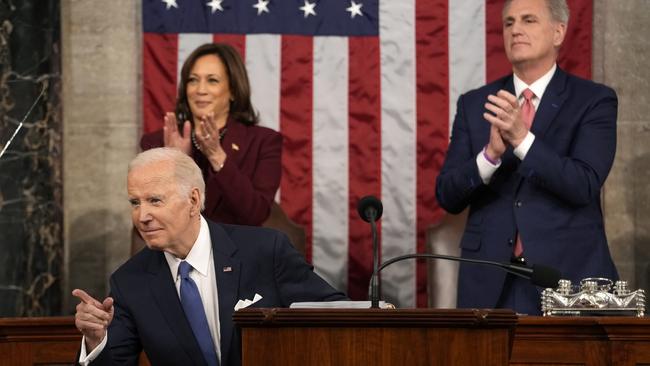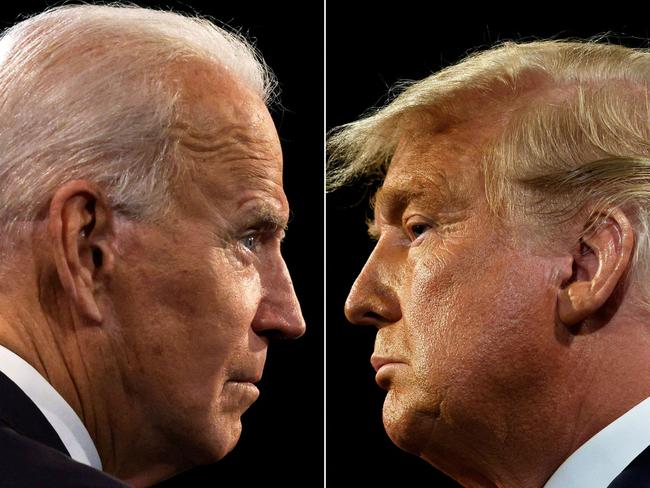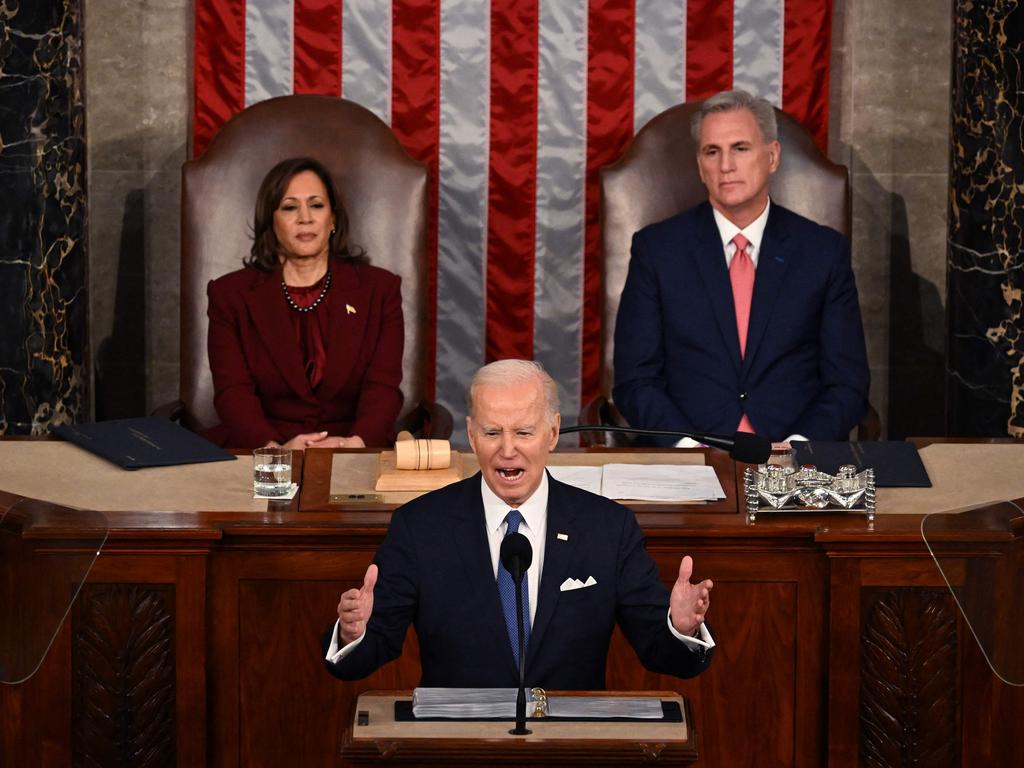Weak, confused Joe Biden looks to Donald Trump for inspiration
The US President borrowed heavily from his 2016 – and possible 2024 – rival.

This is despite the fact he has low approval ratings, a structural budget deficit completely out of control, a party way to the left of the American mainstream, and most voters, both Democrats and Republicans, don’t want him to run again.
Biden’s State of the Union address, at the midpoint of this presidential term, borrowed slabs of rhetoric straight from Donald Trump. In partial denial of the woke weirdness of much of the contemporary Democratic Party, which he has generally not opposed, he attempted to sell himself as the old Six-Pack Joe, the guy who likes a beer at the end of the day, not a Frappuccino or a cocktail, the regular fella from Delaware. For Biden, in terms of political persona, this is an oldie but a goodie. Not too fancy, not too high-falutin’. Not the kind of leader who accuses regular folks of clinging bitterly to guns and religion, who describes blue-collar workers as deplorables.
The SOTU represents nonetheless a significant new phase in Biden rhetoric. He no longer focuses on racial or gender issues. He didn’t mention Trump and didn’t denounce Make America Great Again Republicans. He no longer accuses Republicans of being a threat to democracy.
Instead, almost channelling Tip O’Neill from several generations ago, he went back to the perennials of Democrat rhetoric, accusing Republicans of planning to abolish Social Security and Medicare. These accusations are plainly false. They resemble Labor telling Australian voters the Turnbull and Morrison governments planned to abolish Medicare in Australia. But the claims were untrue within the normal standard deviations of legitimate politics.
And while the address was overwhelmingly domestic, on international affairs Biden was as muscular as any modern Democrat is likely to be. He roundly condemned Russia’s Vladimir Putin and pledged to continue leading Western efforts to assist Ukraine in its struggle against Moscow. On China, Biden didn’t mention the spy balloon but he did tell Xi Jinping in unmistakeable language if Beijing took action that threatened American sovereignty, “we will act”.
Biden is attempting a new synthesis for American centre-left politics. Its key domestic elements are green protectionism, welfare populism and denial of fiscal reality. It might just work; then again, maybe not.
Biden’s Democrats, especially young activists, are passionate about reducing greenhouse gas emissions. But actions to do this impose heavy costs on the economy, particularly by making energy expensive. In the recent past even Democrat-controlled congresses were reluctant to do too much. Trump, on the other hand, couldn’t care less about greenhouse gases and did everything in his power to unleash American fossil fuels. The US became not only energy self-sufficient but also a big energy exporter.

Biden’s new approach involves traditional protectionism, trade barriers and preferential federal spending to support US industries; plus vast subsidies to any industry that can be called green or pro-climate; plus national security measures, essentially aimed against China, to secure US supply chains.
Put simply, Biden is trying to disguise the cost of his green agenda, or at least convince Americans to bear the cost, by subsidising it all with seemingly limitless amounts of money. In so far as there is a coherent policy idea behind this political management technique, it must be that if you subsidise green industries long enough, they may become economically viable or even competitive.
Biden’s protectionist rhetoric is pure Trump. Consider Biden’s words: “Too many good-paying manufacturing jobs moved overseas. Factories at home closed down. Once-thriving cities and towns became shadows of what they used to be. And along the way, something else was lost. Pride. That sense of self-worth.”
Biden also channels Trump on China. Just as Trump claimed that Beijing routinely got the better of America before Trump came along, Biden makes the same claim, in almost identical terms, about himself. So Biden says: “Before I came to office, the story was about how the People’s Republic of China was increasing its power and America was falling in the world. Not any more …
“I will make no apologies that we are investing to make America strong. Investing in American innovation, in industries that will define the future, and that China’s government is intent on dominating … Modernising our military to safeguard stability and deter aggression. Today we are in the strongest position in decades to compete with China or anyone else … And let’s be clear, winning the competition with China should unite all of us.”
Biden has completely imbibed Trump’s industrial protectionism and adversarial attitude towards Beijing. There is nothing wrong with that. He has the sense to realise that however odious Trump’s personal and political behaviour sometimes was, he got parts of his presidency right.
Of course, Biden has his differences with Trump. Rhetorically, and in substance, Biden invests strongly in US alliances.
But his announcement that the US government would “buy American” all the time is pure Trump and a repudiation of free trade. So is his industry policy, the determination that the US government will direct the development of strategic industries and that the scope of industries so defined will be vast. There are echoes of Biden in Jim Chalmers’ recent essay in The Monthly.
The way Biden seeks to fuse protectionism, green policy and national security is evident in his administration’s approach to electric vehicles. US-made electric vehicles will get huge subsidies, but these subsidies are available only to manufacturers that use batteries that are American-made or made by nations that have free-trade agreements with America.
Biden did not outline in his SOTU the policy that will favour not only American production in critical supply chains but production by US allies and strategic friends. If Australia were still capable of any serious manufacturing, this would be of tremendous benefit to us. It may still help us in submarines and other military ventures, and should eventually lead to a rare earths mineral industry in Australia.
Not all of Biden’s subsidies are for purely green industries. He has set aside hundreds of billions of dollars to support microchip manufacture in the US. Similarly, he has tempered his green evangelism to take account of the reality of fossil fuel industries and their necessity to the US economy. He repeatedly says the US will need oil and gas for many years to come. This is obviously true but not the way anyone on the left of the Democratic Party speaks.
The American left has basically decided to back Biden and accept his compromises. Biden reminded me of Anthony Albanese, who in the first months of the new Labor government seemed to be the only minister willing to point out that Australia would need new coal and gas mines for years ahead, especially for export. Biden has managed to get trillions of dollars of stimulus, subsidy, green projects, pork-barrelling and the like into the economy.
Following the end of the emergency spending on Covid-19, and with the end of Covid lockdowns, the eye-watering deficit declined a little and the economy added a lot of jobs. But the structural deficit is huge and growing. Unemployment is 3.4 per cent in the US, a 50-year low. But persistent inflation is slashing incomes.
Every normal political indicator suggests Biden is a weak president who will struggle to win next year. A new poll suggests 71 per cent of Americans believe their country is on the wrong track. Biden’s approval ratings never lift more than momentarily above the low 40s, which doesn’t guarantee defeat but indicates vulnerability. Big majorities of voters of both parties don’t want him to run again.
Then there are the cognitive issues. The SOTU was, by Biden’s standards, almost gaffe free. But Biden did begin by calling Democrat Chuck Schumer the Senate minority leader, whereas he is the majority leader. Then, in remarks not in the written text, Biden went into a bizarre riff in which he claimed that no leader in the world wants to change places with Xi.
He repeated this perfectly dotty claim several times, seeming to get increasingly angry as he said it. Biden’s words here are beyond rational parsing. Is he really saying that the leaders of South Sudan, or Burkina Faso, Laos, or wherever, would not want to have the power and resources available to Xi? And is he claiming this is so because he, Biden, has rendered Xi’s position so hopeless?
Of course Trump said so many insane things that he took much sting out of this sort of problem. And Biden benefits from a career of often fruity words. In the vice-presidential debate against Sarah Palin in 2008 he even claimed he had chased Hezbollah out of Lebanon. Hezbollah rules southern Lebanon to this day.
Because these sorts of gaffes have been part of Biden’s persona for so long, he enjoys some immunity to the damage they should cause him. At the last election, campaigning was greatly restricted by Covid. Then in the live presidential debates Trump was so aggressive and so often spoke over Biden that his mental slowness was not exposed.
It will be different if the Republican candidate next time is someone like Florida Governor Ron DeSantis. Like Biden, DeSantis makes much of his appeal on the good parts of Trump. DeSantis so far seems the main candidate whom Trump Republican voters, anti-Trump Republicans and independents could support.
DeSantis’s youth and vigour would contrast hugely with Biden’s age and growing feebleness. Not only that, DeSantis has shown Republicans how to wage culture wars successfully. When DeSantis bans critical race theory in Florida schools or instruction in gender diversity for infants, he becomes the champion of regular parents against woke nuttiness.
DeSantis can be pretty hard line, but he is infinitely more intelligent about the way he pursues issues than Trump ever was. Trump has begun seriously defaming DeSantis, claiming he used to groom young girls with alcohol. This is presumably on a level with Trump’s claim in 2016 that the father of Republican primary rival Ted Cruz was involved with the assassination of John F. Kennedy.
Every night when he says his prayers, Biden surely asks that Trump be his opponent next year. Biden’s position within the Democratic Party strengthened immeasurably after the midterm congressional elections. Democrats increased their Senate majority and only just lost the House of Representatives.
Naturally Biden claims this as personal vindication. It was nothing of the kind. It was almost entirely an anti-Trump vote by independents and a serious minority of Republicans. Those Republican candidates most closely identified with Trump lost badly in seats Republicans normally win. Non-Trump Republicans won handsomely. So any decent mainstream Republican stands an excellent chance of defeating Biden. Unless of course Trump destroys the Republicans chances during the primaries.
Walter Russell Mead is one of the most astute and profound thinkers on American foreign policy and politics. A renowned academic, author and columnist for The Wall Street Journal, he is visiting Australia.
In a substantial conversation, he told me he thinks Trump is weaker than he was even a year ago. Mead suggests a telling analytical comparison: “In some ways Trump reminds me of one of those televangelists. His businesses must have suffered during Covid, no one was playing golf or going to hotels. And we know he was very highly leveraged. Like one of those televangelists, he relies on the fanatical devotion of a fairly small number of people to continue to derive income. So to keep that flowing he has to look like he’s running for president. But he must not adopt positions which alienate these people. So he can’t adopt positions which would help him become president.”
Trump won a legitimate but narrow and flukey victory in 2016. Ever since then he has brought the Republicans electoral defeat.
Mead sees Biden’s SOTU as conventionally focused on the domestic audience. The SOTU is the president’s best chance to be heard by large numbers of American voters. What struck Mead most about the speech? “The real revolution in American foreign policy,” he says, “is the protectionism. That’s the triumph of Trump.” That protectionism, in the face of previous Chinese exploitation of open American markets, is understandable, and in national security areas justified. But it does place a certain limit on the effectiveness of US policy in the global south, what in the glory days of the Cold War used to be called the Third World.
Mead wrote recently that much of the global south is seriously disconnected from, if not totally disillusioned with, the liberal international order. These nations want vast amounts of aid, whether climate aid or something else, plus investment and trade, from the rich world, they don’t want lectures on democracy, human rights and the rules-based order.
In the past, the US influenced developing countries not just, perhaps not even primarily, through its example of democracy but by providing them with security and allowing them privileged access to America’s vast market. Those days, as Biden’s protectionism and lack of a trade agenda in Asia suggest, are presumably gone for good.
Biden is by no means the worst president the US could have. He has behaved within the law, continued Washington’s hard-headed reappraisal of Beijing, led, with some caution, Western resolve in helping Ukraine and honoured alliances. His fiscal strategy is reckless in the extreme. His economic policy can work only while the US keeps running up vast debt. And he has enabled a good deal of cultural madness. At 82, he would be a poor choice for president. Our poor blighted planet might even be faced with a Biden-Trump re-run. Nonetheless, America’s ability to muddle through, as these past years have demonstrated, remains prodigious.





Joe Biden owns the Democratic Party, at least at the level of the presidency. He plans to be re-elected president next year at the tender age of just shy of 82, thus being 86 when he finishes a putative second term.